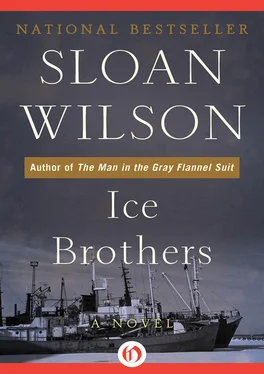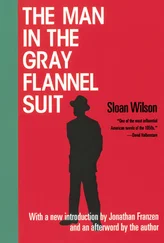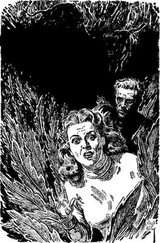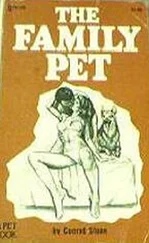“How did you guess?”
“You’ve got to learn how to handle enlisted men. You can’t just stand there arguing with them like that, lowering yourself to their level.”
“What would you have done?”
“Put the man on report and have him carried to his bunk. Find a way to lock him up if necessary and have him taken ashore to a brig in the morning. No fuss.”
“Then you’d lose the damnedest cook there ever was.”
“It’s easy to get cooks,” the lieutenant said disdainfully. “You have to learn to maintain discipline. One incident like that can spread.”
“Thanks for your advice. Now would you mind putting that light out? It hurts my eyes.”
“Men rarely cause trouble in a brightly lit place,” the officer said. “Better leave it on for the night to prevent a recurrence.” He went into the wardroom of his ship.
Paul couldn’t think of any regulation which might allow him to shoot out a light on another man’s ship. Muttering to himself, he went below to his own wardroom. A steam radiator hissed and it was much too hot. After opening the portholes, he sat down at the table and looked around. It was a bleak, stuffy little room. How many years would he have to spend in it? And why, oh why, hadn’t he done what Sylvia wanted, and stayed in college till June instead of hurrying to join up? If he’d done that, he’d have three more whole months to live with his beautiful wife in their little apartment under the eaves of that old colonial house, the memory of which already seemed distant and Utopian. Before his classmates even got in the service, he’d probably be dead, sunk in an Arctic sea by some monstrous German ship.
Almost crying with homesickness, self-pity and regret, Paul climbed into his bunk and quickly slept.
CHAPTER 7
In the morning Cookie seemed alert and energetic as ever, though his eyes were red. As soon as Paul appeared at the table in the forecastle, Cookie brought him freshly squeezed and iced orange juice, croissants, coffee and a mushroom omelet. Paul did not have a chance to do justice to this repast before he heard a fearful thumping on deck and a rising babble of Southern voices.
“Watch out thea, son. What kind of a mothah fucka is this here crazy fishboat anyhow?”
The voices sounded black to Paul, but the men were all white. He got the impression that dozens of sailors, all dressed in soiled and rumpled blue uniforms, were throwing sea bags to the deck of the Arluk and jumping aboard. They were led by a fat chief machinist’s mate with gold hashmarks up to his elbows.
“What’s going on here, Chief?” Paul asked, still wiping his mouth with his handkerchief.
“All these here men have been assigned to this ship,” the chief said. “It sure looks like somebody don’t like us Southern boys.”
“Where are you all from?”
“Well, we was all in the brig, and this son of a bitch from personnel came through this morning and picked all us Southern boys for the Greenland Peetrol.”
“Well, I ain’t no Southern boy,” a burly gunner’s mate whom Paul recognized as the man he had seen with the blonde in the telephone booth said in a New England accent. “You guys are all from the Cayuga , ain’t you?”
“So what if we are?”
“Well you guys been fucking up ever since you got into port. You the guys that cleaned out the Silver Dollar Bar, ain’t you? And ain’t you the guys that chased that old tassel girl right out of the Crawford House into the street and around the block? Well, they told us all that if we fucked up again we’d land on the Greenland Patrol. They’re making an example out of us. You must have fucked up again last night, just like I did.”
“We just got tossed out of the Old Howard,” the chief machinist’s mate said. “We didn’t cause no damage.”
“You chased the girls on the stage again. I heard about it. We all fucked up and here we are, examples on the Greenland Patrol.”
There was a rising chorus of moans and protestations. Paul was suddenly aware that the aloof lieutenant j.g. was out on the wing of his bridge again, disdainfully watching him.
“All right! ” Paul said angrily as sea bags bounced all around him and the confusion mounted. “Quiet! You men fall in here on the well deck. I want no more Chinese fire drill. This may look like a fish boat, but she’s now a United States Coast Guard cutter. All right . Attention!”
Now that they were all lined up at attention, Paul had no idea what to do with them. He decided to give them a speech, pretending he was a marine sergeant in the movies, or maybe a captain in the Foreign Legion.
“All right, you men are brig rats. We’ll forget that. All we care is how you act from now on. And if you foul up again, you won’t go back to a nice warm brig. We got other ways of handling foul-ups on the Greenland Patrol. Try us and you’ll see. Now I’ll have bunks assigned to you men. Your first job will be to clean up yourselves and your gear. And do it quietly. The first man who raises a racket will get the first taste of how we handle things on the Greenland Patrol. At ease. Fall out!”
Noticing that Farmer had come from the wardroom to see what was going on, Paul added, “See that these men get settled, Mr. Farmer, and take no nonsense from them.”
“Aye, aye, sir,” Farmer said. “Come on, boys, and I’ll see you get bunks.”
Paul walked to the wardroom, clicking his heels hard on the pine decks. Green was lying in his bunk studying a copy of Knight’s Modern Seamanship which Paul had lent to him. “What the hell is going on up there?” he asked.
Paul sat down at the table and suddenly broke into laughter. “I don’t know,” he said. “A bunch of guys from the brig came aboard, and I had to straighten them out. I don’t know if I’m Captain Bligh, Errol Flynn or Sergeant York, but it seemed to work.”
Paul’s bravura act did not work for long, however. The new members of the crew were old Coast Guard hands, and they soon recognized him as a raw reserve officer, Green as a man who knew even less than Paul did about ships, and Farmer as a nice old fisherman who cared nothing about military discipline. When the officers tried to get them to scrub the decks, wash down interior bulkheads and stow the mountains of gear that were constantly being shoved aboard, they cheerfully began the tasks and abandoned them as soon as the officers turned their backs. They bickered constantly with each other and the yard workers, engaged in frequent scuffling matches, carried beer cans and pints of whiskey in their pockets and kept the ship in shambles. Green simply retreated to his bunk, and Farmer sat on the bridge sorrowfully shaking his head. Paul kept yelling at the men more and more and always got instant obedience that lasted only for an instant.
“I don’t know what to do with them,” he said in exasperation to Green. “Do you suppose we could send them all back to the brig?”
“The guys ashore know better than to take them,” Green replied morosely. “I keep dreaming of the ship sinking. It used to be a horror dream, but now I’ve begun to look forward to it. At least the noise would stop.”
Just as Paul was about to go home to his wife and leave the mess to Farmer for a night, two of the newly arrived machinist’s mates had a fight in the engine room. This was no prank — they fought with ballpeen hammers. One was knocked out and both were blinded with blood before they were parted. By the time Paul got them on an ambulance and figured out the legal procedures, it was far too late for him to go home and he was too exhausted anyway.
“What happened?” Sylvia wailed when he finally got to a telephone.
“I couldn’t begin to tell you. Top secret. I’ll be home as soon as I can, dear. I don’t know when. I’m beginning to think that fighting the Germans and the Japs will be the easiest part of this war.”
Читать дальше












